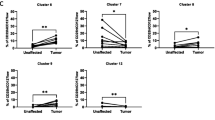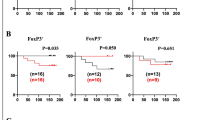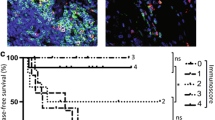Abstract
The ability of the host to mount an appropriate immune response to aberrant cells is one factor that determines prognosis in cancer patients. Naturally occurring regulatory T cells (T regs; CD4+ CD25+ cells) are key regulators of peripheral tolerance. It has been suggested that high levels of T regs are detrimental to the patient in some forms of cancer, but the role of these antigen-specific cells in individuals with colorectal cancers with high levels of microsatellite instability is unknown. Herein, we examined the ability of individuals with MSI-H or microsatellite stable colon cancer to recruit lymphocytes to the tumor site. Immunohistochemical staining was performed on archived paraffin-embedded specimens from a total of 38 individuals with MSI-H (n = 25) or MSS (n = 13) colon cancers to determine the proportion of CD3+, CD8+ and CD25+ cells infiltrating the tumor site. Patients with MSI-H colon cancers had increased percentages of CD8+ TILs (cytotoxic T cells) as compared to individuals with MSS colon cancer (47.3 vs. 24.04% of the infiltrate CD8+, respectively). No differences in the levels of CD25+ T cells were observed between individuals with MSI-H colon cancers and MSS colon cancers (0.53 vs. 0.54% CD25+, respectively). Together, these data suggest that the survival advantage enjoyed by patients with MSI-H colorectal cancer may, in part, be attributed to the increased cytolytic response, but not to an antigen-specific immunosuppressive response in MSS patients.


Similar content being viewed by others
Abbreviations
- CRC:
-
Colorectal cancer
- HNPCC:
-
Hereditary nonpolyposis colorectal cancer
- HPF:
-
High power field
- MSI-H:
-
High level of microsatellite instability
- MSS:
-
Microsatellite stable
- T regs:
-
Regulatory T cells
- TILs:
-
Tumor infiltrating lymphocytes
References
Jemal A, Thomas A, Murray T, Thun M (2004) Cancer statistics. CA Cancer J Clin 54:8–29
Lynch HT, de la Chapelle A (1999) Genetic susceptibility to nonpolyposis colorectal cancer. J Med Genet 25:801–818
Vogelstein B, Kinzler KW (1998) The genetic basis of human cancer. McGraw Hill, New York
Lynch HT, de la Chapelle A (2003) Hereditary colorectal cancer. N Eng J Med 348:919–932
Thibodeau SN, Bren G, Schaid D (1993) Microsatellite instability in cancer of the proximal colon. Science 260:816–819
Aaltonen LA, Peltomäki P, Leach FS et al (1993) Clues to the pathogenesis of familial colorectal cancer. Science 260:812–816
Ionov Y, Peinado MA, Malkhosyan S et al (1993) Ubiquitous somatic mutations in simple repeated sequences reveal a new mechanism for colonic carcinogenesis. Nature 363:558–561
Wright CM, Dent OF, Barker M (2000) The prognostic significance of extensive microsatellite instability in sporadic clinicopathological stage C colorectal cancer. Br J Surgery 87:1197–1202
Gryfe R, Kim H, Hsieh ET et al (2000) Tumor microsatellite instability and clinical outcome in young patients with colorectal cancer. N Eng J Med 342:69–77
Samowitz WS, Curtin K, Ma K-N et al (2001) Microsatellite instability in sporadic colon cancer is associated with an improved prognosis at the population level. Can Epidemiol Biomark Prev 10:917–923
Lothe RA, Peltomaki P, Meling GI (1993) Genomic instability in colorectal cancer: relationship to clinicopathological variables and family history. Cancer Res 53:5849–5852
Fukunaga A, Miyamoto M, Cho Y et al (2004) CD8+ tumor-infiltrating lymphocytes together with CD4+ tumor-infiltrating lymphocytes and dendritic cells improve the prognosis of patients with pancreatic adenocarcinoma. Pancreas 28:e26–e31
Yakirevich E, Lefel O, Sova Y et al (2002) Activated status of tumour-infiltrating lymphocytes and apoptosis in testicular seminoma. J Pathol 196:67–75
Ropponen KM, Eskelinen MJ, Lipponen PK et al (1997) Prognostic value of tumour-infiltrating lymphocytes (TILs) in colorectal cancer. J Pathol 182:318–324
Kitayama J, Nagawa H, Nakayama H et al (1999) Functional expression of β1 and β2 integrins on tumor infiltrating lymphocytes (TILs) in colorectal cancer. J Gastroent 34:327–333
Fukuzawa Y, Takahashi K, Furuta K et al (2001) Expression of Fas/Fas ligand (FasL) and its involvement in infiltrating lymphocytes in hepatocellular carcinoma. J Gastroent 36:681–688
Okada K, Komuta K, Hashimoto S et al (2000) Frequency of apoptosis of tumor-infiltrating lymphocytes induced by fas counterattack in human colorectal carcinoma and its correlation with prognosis. Clinical Cancer Research 6:3560–3564
Bennett MW, O’Connell J, O’Sullivan GC et al (1998) The fas counterattack in vivo: apoptotic depletion of tumor-infiltrating lymphocytes associated with fas ligand expression by human esophageal carcinoma. J Immunol 160:5669–5675
Alexander J, Wantanabe T, Wu TT et al (2001) Histopathological identification of colon cancer with microsatellite instability. Am J Pathol 158:527–535
Smyrk TC, Watson P, Kaul K, Lynch HL (2001) Tumor infiltrating lymphocytes are a marker for microsatellite instability in colorectal cancer. Cancer 91:2417–2422
Ikeguchi M, Oi K, Hirooka Y, Kaibara N (2004) CD8+ lymphocyte infiltration and apoptosis in hepatocellular carcinoma. EJSO 30:53–57
Lippman SM, Spier CM, Miller TP et al (1990) Tumor-infiltrating T-lymphocytes in B-cell diffuse large cell lymphoma related to disease course. Mod Pathol 3:361–367
Shimizu J, Yamazaki S, Sakaguchi S (1999) Induction of tumor immunity by removing CD25+ CD4+ T cells: a common basis between tumor immunity and autoimmunity. J Immunol 163:5211–5218
Karja V, Aaltomaa S, Lipponen P et al (2005) Tumor-infiltrating lymphocytes: a prognostic factor of PSA-free survival in patients with local prostate carcinoma treated by radical prostatectomy. Antican Res 25:4435–4438
Tsujitani S, Kakeji Y, Maehara Y et al (1993) Dendritic cells prevent lymph node metastasis in patients in gastric cancer. In Vivo 7:233–237
Reichert TE, Strauss L, Wagner EM et al (2002) Signaling abnormalities, apoptosis, and reduced proliferation of circulating and tumor-infiltrating lymphocytes in patients with oral carcinoma. Clin Can Res 8:3137–3145
Ohta M, Tanaka F, Yamaguchi H et al (2005) The high expression of fractalkine results in a better prognosis for colorectal cancer patients. Int J Oncol 26:41–47
Guo SJ, Lin DM, Li J et al (2007) Tumor-associated macrophages and CD3-zeta expression of tumor-infiltrating lymphocytes in human esophageal squamous-cell carcinoma. Dis Esophagus 20:107–116
Ishigama S, Natsugoe S, Tokuda K et al (2002) CD3-ζ chain expression of intratumoral lymphocytes is closely related to survival in gastric carcinoma patients. Cancer 94:1437–1442
Houston A, Bennett MW, O’Sullivan GC et al (2003) Fas ligand mediates immune privilege and not inflammation in human colon cancer, irrespective of TGF-β expression. Br J Can 89:1345–1351
Phillips SM, Banerjea A, Feakins R et al (2004) Tumour-infiltrating lymphocytes in colorectal cancer with microsatellite instability are activated and cytotoxic. Br J Surgery 91:469–475
Bennett MW, O’Connell J, O’Sullivan GC et al (1999) Expression of fas ligand by human gastric adenocarcinomas: a potential mechanism of immune escape in stomach cancer. Gut 44:156–162
Lahl K, Loddenkemper C, Drouin C et al (2007) Selective depletion of Foxp3+ regulatory T cells induces a scurfy-like disease. J Exp Med 204:57–63
Suri-Payer E, Amae AZ, Thornton AM et al (1998) CD4+ CD25+ T cells inhibit both the induction and effector function of autoreactive T cells and represent a unique lineage of immunoregulatory cells. J Immunol 160:1212–1218
Woo EY, Yeh H, Chu CS et al (2002) Cutting edge: regulatory T cells from lung cancer patients directly inhibit autologous T cell proliferation. J Immunol 168:4272–4276
Sutmuller RPM, van Duivenvoorde LM, van Elsas A et al (2001) Synergism of cytotoxic T lymphocyte-associated antigen 4 blockade and depletion of CD25+ regulatory T cells in antitumor therapy reveals alternative pathways for suppression of autoreactive cytotoxic T lymphocyte responses. J Exp Med 194:823–832
Green EA, Choi Y, Flavell RA (2002) Pancreatic lymph node-derived CD4+ CD25+ T reg cells: highly potent regulators of diabetes that require TRANCE-RANK signals. Immunity 16:183–191
Cao M, Cabrera R, Xu Y et al (2007) Hepatocellular carcinoma cell supernatants increase expansion and function of CD4+ CD25+ regulatory T cells. Lab Invest 87:582–590
Petersen RP, Campa MJ, Sperlazza J et al (2006) Tumor infiltrating foxp3+ regulatory T cells are associated with recurrence in pathologic stage I NSCLC patients. Cancer 107:2866–2872
Hinz S, Pagerols-Raluy L, Oberg HH et al (2007) Foxp3 expression in pancreatic carcinoma cells as a novel mechanism of immune evasion in cancer. Cancer Res 67:8344–8350
Liu VC, Wong LY, Jang T et al (2007) Tumor evasion of the immune system by converting CD4+ CD25 T cells into CD4+ CD25+ T regulatory cells: role of tumor-derived TGF-β. J Immunol 178:2883–2892
Siddiqui SA, Frigola X, Bonne-Annee S et al (2007) Tumor-infiltrating Foxp3-CD4+ CD25+ T cells predict poor survival in renal cell carcinoma. Clin Can Res 13:2075–2081
Cornish GH, Sinclair LV, Cantrell DA (2006) Differential regulation of T-cell growth by IL-2 and IL-15. Blood 108:600–608
Boland CR, Thibodeau SN, Hamilton SR et al (1998) A National Cancer Institute workshop on microsatellite instability for cancer detection and familial predisposistion: development of international criteria for the determination of microsatellite instability in colorectal cancer. Cancer Res 58:5248–5257
Thibodeau SN, French AJ, Cunningham JM (1998) Microsatellite instability in colorectal cancer: different mutator phenotypes and the principal involvement of hMLH1. Cancer Res 58:1713–1718
Shia J, Ellis NA, Paty PB et al (2003) Value of histopathology in predicting microsatellite instability in hereditary nonpolyposis colorectal cancer and sporadic colorectal cancer. Am J Surg Pathol 27:1407–1417
Fridrichova I (2006) New aspects in molecular diagnosis of Lynch syndrome (HNPCC). Cancer Biomark 2:37–49
Baudi F, Fersini G, Lavecchia A et al (2005) A novel missense germline mutation in exon 2 of the hMSK2 gene in a HNPCC family from Southern Italy. Cancer Lett 8:285–291
Lynch HT, Albano W, Recabaren J et al (1981) Prolonged survival as a component of hereditary breast and nonpolyposis colon cancer. Med Hypotheses 7:1201–1209
Albano WA, Recabaren JA, Lynch HT et al (1982) Natural history of hereditary cancer of the breast and colon. Cancer 50:360–363
Watson P, Lin K, Rodriguez-Bigas MA et al (1998) Colorectal carcinoma survival among hereditary nonpolyposis colorectal cancer family members. Cancer 83:259–266
Sankila R, Aaltonen LA, Jarvinen HJ, Mecklin JP (1996) Better survival rates in patients with MLH-1 associated hereditary colorectal cancer. Gastroenterology 110:682–687
Ward PL, Koeppen HK, Hurteau T et al (1990) Major histocompatibility complex class I and unique antigen expression by murine tumors that escaped from CD8+ T-cell-dependent surveillance. Cancer Res 50:3851–3858
Jass JR (2004) Role of the pathologist in the diagnosis of hereditary non-polyposis colorectal cancer. Dis Markers 20:215–224
Michael-Robinson JM, Pandeya N, Cummings MC et al (2003) Fas ligand and tumour counter-attack in colorectal cancer stratified according to microsatellite instability status. J Pathol 201:46–54
Dolcetti R, Viel A, Doglioni C et al (1999) High prevalence of activated intraepithelial cytotoxic T lymphocytes and increased neoplastic cell apoptosis in colorectal carcinomas with microsatellite instability. Am J Pathol 154:1805–1813
Pagès F, Berger A, Camus M et al (2005) Effector memory T cells, early metastasis, and survival in colorectal cancer. N Eng J Med 353:2654–2666
O’Connell J, Bennett MW, O’Sullivan GC et al (1999) Expression of fas (CD95/APO-1) ligand by human breast cancers: significance for tumor immune privilege. Clin Diag Lab Immunol 6:457–463
Saio M, Radoja S, Marino M, Frey AB (2001) Tumor-infiltrating macrophages induce apoptosis in activated CD8+ T cells by a mechanism requiring cell contact and mediated by both the cell-associated form of TNF and nitric oxide. J Immunol 167:5583–5593
Kim JW, Ferris RL, Whiteside TL (2005) Chemokine C receptor 7 expression and protection of circulating CD8+ T lymphocytes from apoptosis. Clin Can Res 11:7901–7910
Prado-Garcia H, Aguilar-Cazares D, Flores-Vergara H et al (2005) Effector, memory and naive CD8+ T cells in peripheral blood and pleural effusion from lung adenocarcinoma patients. Lung Can 47:361–371
Kanai T, Watanabe M, Hayashi A et al (2000) Regulatory effect of interleukin-4 and interleukin-13 on colon cancer cell adhesion. Br J Cancer 82:1717–1723
Riedl E, Strobl H, Majdic O, Knapp W (1997) TGF-β1 promotes in vitro generation of dendritic cells by protecting progenitor cells from apoptosis. J Immunol 158:1591–1597
Tamm I, Kikutami T, Cardinale I, Krueger JG (1994) Cell-adhesion-disrupting action of interleukin-6 in human ductal breast carcinoma cells. Proc Nat Acad Sci USA 91:3329–3333
Tamm I, Cardinale I, Kikutami T, Krueger JG (1994) E-cadherin distribution in interleukin 6-induced cell-cell separation of ductal breast carcinoma cells. Proc Nat Acad Sci USA 91:4338–4342
Catalano MG, Fortunati N, Arena K et al (2007) Selective up-regulation of tumor necrosis factor receptor I in tumor-bearing rats with cancer-related cachexia. Int J Oncol 23:429–436
Suzuki S, Mita S, Kamohara H et al (2001) IL-6 and IFN-gamma regulation of IL-10 production by human colon carcinoma cells. Int J Oncol 18:581–586
Huang J, Wang Y, Guo J et al (2007) Radiation-induced apoptosis along with local and systemic cytokine elaboration is associated with DC plus radiotherapy-mediated renal cell tumor regression. Clin Immunol 123:298–310
Jass JR (2004) HNPCC and sporadic MSI-H colorectal cancer: a review of morphologic similarities and differences. Fam Cancer 3:93–100
Ebert EC, Brolin RE, Roberts AI (1989) Characterization of activated lymphocytes in colon cancer. Clin Immunol Immunopath 50:72–81
Chaput N, Darrasse-Jeze G, Bergot A-S et al (2007) Regulatory T cells prevent CD8 T cell maturation by inhibiting CD4 Th cells at tumor sites. J Immunol 179:4969–4978
Diederichsen ACP, Zeuthen J, Christensen PB, Kristensen T (1999) Characterisation of tumour infiltrating lymphocytes and correlations with immunological surface molecules in colorectal cancer. Eur J Can 35:721–726
Ormandy LA, Hillemann T, Wedemeyer H et al (2005) Increased populations of regulatory T cells in peripheral blood of patients with hepatocellular carcinoma. Cancer Res 65:2457–2464
Okita R, Saeki T, Takashima S et al (2005) CD4+ CD25+ regulatory T cells in the peripheral blood of patients with breast cancer and non-small cell lung cancer. Oncol Rep 14:1269–1273
Kono K, Kawaida H, Takahashi A et al (2006) CD4(+) CD25(high) regulatory T cells increase with tumor stage in patients with gastric and esophageal cancers. Cancer Immunol Immunother 55:1064–1071
Ichihara F, Kono K, Takahashi A et al (2003) Increased populations of regulatory T cells in peripheral blood and tumor-infiltrating lymphocytes in patients with gastric and esophageal cancers. Clin Can Res 9:4404–4408
Loddenkemper C, Schernus M, Noutsias M et al (2006) In situ analysis of FOXP3+ regulatory T cells in human colorectal cancer. J Translation Med 4:52–59
Mori Y, Yin J, Rashid A et al (2001) Instabilotyping: comprehensive identification of frameshift mutations by coding region microsatellite instability. Can Res 61:6046–6049
Linnebacher M, Gerbert J, Rudy W et al (2001) Frameshift peptide-derived T-cell epitopes: a source of novel tumor-specific antigens. Int J Cancer 93:6–11
Schwitalle Y, Kloor M, Eiermann S et al (2008) Immune responses against frameshift-induced neopeptides in HNPCC patients and healthy HNPCC mutation carriers. Gastroenterology 134:988–997
Kloor M, Michel S, Buckowitz B et al (2007) (2007) Beta2-microglobulin mutations in microsatellite unstable colorectal tumors. Int J Cancer 121:454–458
Bicknell DC, Kaklamanis L, Hampson R et al (1996) Selection for β2 microglobulin mutation in mismatch repair-defective colorectal carcinomas. Curr Biol 6:1695–1697
Acknowledgments
Grant support This research was supported by revenue from Nebraska Cigarette Taxes awarded to Creighton University by the Nebraska, Department of Health and Human Services (LB 595; KMD, HTL). Its contents are solely the responsibility of the authors and do not necessarily represent the official views of the State of Nebraska or the Nebraska Department of Health and Human Services. The National Institutes of Health Early Detection Research Network Grant #1U01CA86389 also provided support for these studies. Dr. Henry Lynch holds the Charles F. and Mary C. Heider Chair in Cancer Research at Creighton University. This investigation was conducted in a facility constructed with support from Research Facilities Improvement Program (1 C06 RR17417-01) from the National Center for Research Resources, National Institutes of Health.
Author information
Authors and Affiliations
Corresponding author
Additional information
Kristen M. Drescher and Poonam Sharma have been contributed equally to this study.
Rights and permissions
About this article
Cite this article
Drescher, K.M., Sharma, P., Watson, P. et al. Lymphocyte recruitment into the tumor site is altered in patients with MSI-H colon cancer. Familial Cancer 8, 231–239 (2009). https://doi.org/10.1007/s10689-009-9233-0
Received:
Accepted:
Published:
Issue Date:
DOI: https://doi.org/10.1007/s10689-009-9233-0




